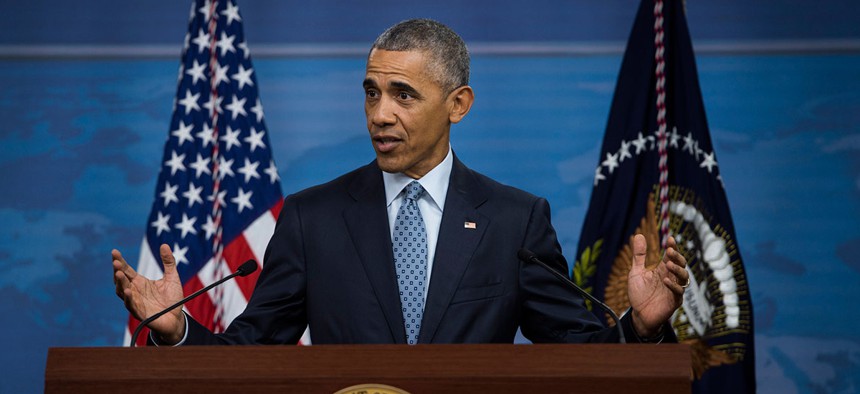
Tech. Sgt. Brigitte N. Brantley/Air Force
Obama’s View of ISIS, Two Years Into Air Strikes
The president said Thursday bombing targets in Iraq and Syria is “necessary, but not sufficient” in the long term.
President Obama frames U.S. military operations against the Islamic State in Iraq and Syria as key to restricting its ability to inspire homegrown terrorists all over the world. “The strategy we have in Syria and Iraq is necessary, but not sufficient,” he said. “We have to do a better job of disrupting networks, and those networks are more active in Europe than they are here. But we don’t know what we don’t know, and so it’s conceivable that there are some networks here that could be activated.”
Obama addressed reporters at a press conference Thursday after meeting with national-security officials at the Pentagon for a briefing on the military campaign against the Islamic State. Next week marks almost two years since the U.S. began its air strikes in Iraq and Syria. U.S. forces now conduct near-daily strikes in those countries, and last November expanded its air campaign to a handful of ISIS targets in Libya. This week, the Pentagon announced its latest and largest military action in Libya to date: air strikes in the city of Sirte, which has been under ISIS control since early 2015.
Obama said Thursday the terror threat to the homeland is serious, because of the lone actors or small cells that can become radicalized on the internet and carry out attacks on the Islamic State’s behalf. But the country is still “significantly safer” than it would’ve been without U.S. involvement.
In his last press conference before leaving for a two-week vacation to Martha’s Vineyard, the president responded to recent reports about a $400 million cash payment the government made to Iran in January. White House officials have been on the defensive since the first report, from The Wall Street Journal, revealed new details about the money, which was delivered in non-U.S. currency. TheJournal reports it was part of a larger settlement between the U.S. and Iranian governments “to resolve a decades-old dispute over a failed arms deal signed just before the 1979 fall of Iran’s last monarch.”
But Republican critics allege the money was essentially ransom for four U.S. prisoners released at the time the settlement was announced; or that it was otherwise tied to the administration’s Iran nuclear deal, which went into effect in January. Obama dismissed this claim Thursday.
“We don't pay ransom,” Obama said. “The notion that we would somehow start now, in this high-profile way, and I announced it to the world even as we are looking into the faces of other families whose loved ones are being held hostage—and say to them that we don't pay ransom—defies logic.”
The president suggested critics zeroed in on the fact that the U.S. made the payment in cash “because it kind of feels like some kind of spy novel or crime novel.” He said cash was sent because U.S. sanctions against Iran bar that country from dealing with U.S. financial institutions, which would presumably handle a check or wire transfer. “Some of you may recall we announced these payments in January, many months ago. It wasn’t a secret,” he said. “This wasn’t some nefarious deal.”






